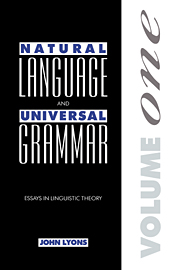Book contents
- Frontmatter
- Contents
- Preface
- Typographical conventions
- 1 Language, speech and writing
- 2 In defence of (so-called) autonomous linguistics
- 3 Linguistic theory and theoretical linguistics
- 4 Natural, non-natural and unnatural languages: English, Urdu and other abstractions
- 5 The origin of language, speech and languages
- 6 Phonemic and non-phonemic phonology: some typological reflections
- 7 Towards a ‘notional’ theory of the ‘parts of speech’
- 8 Deixis as the source of reference
- 9 Deixis and anaphora
- Appendix: The scientific study of language. Inaugural Lecture, Edinburgh, 1965
- Notes
- References
- Subject index
- Names index
Appendix: The scientific study of language. Inaugural Lecture, Edinburgh, 1965
Published online by Cambridge University Press: 05 June 2012
- Frontmatter
- Contents
- Preface
- Typographical conventions
- 1 Language, speech and writing
- 2 In defence of (so-called) autonomous linguistics
- 3 Linguistic theory and theoretical linguistics
- 4 Natural, non-natural and unnatural languages: English, Urdu and other abstractions
- 5 The origin of language, speech and languages
- 6 Phonemic and non-phonemic phonology: some typological reflections
- 7 Towards a ‘notional’ theory of the ‘parts of speech’
- 8 Deixis as the source of reference
- 9 Deixis and anaphora
- Appendix: The scientific study of language. Inaugural Lecture, Edinburgh, 1965
- Notes
- References
- Subject index
- Names index
Summary
It would seem to be appropriate for the occupant of a new Chair in an ancient and major university to present in his Inaugural Lecture, before an audience representative of many different subjects taught and studied in the university, a justification of the subject he is called upon to profess – an apologia pro disciplina sua: to discuss its relation to other disciplines and the contribution it is capable of making to the accepted aims of the university in teaching and research. In my lecture this evening, I will claim a place for linguistics at all levels and in many areas of university activity: as a field of research for scholars confident that they are making a significant contribution to the sum of what we call “science” – that they are, as the currently fashionable phrase puts it, “advancing the frontiers of knowledge” – and also as a subject with important practical, or “technological” applications; and, at the same time, as a discipline which can be combined with many different courses of university instruction, as a valuable part of a general education.
This then is the task I have set myself in my lecture, and I am conscious of all the difficulties that stand in the way of its successful accomplishment.
Information
- Type
- Chapter
- Information
- Natural Language and Universal GrammarEssays in Linguistic Theory, pp. 179 - 201Publisher: Cambridge University PressPrint publication year: 1991
